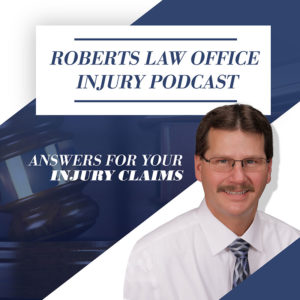Episode 64: In this episode, Calloway County workers’ compensation attorney Jeff Roberts answers common questions about your workers’ compensation claim. Jeff has offices in both Murray and Hopkinsville, Kentucky. He’s practiced workers’ comp law for the past 30 years. He realizes that if you’ve been injured, you need the right answers, quickly.
Jeff Roberts Is a “Go-To” Attorney for Other Attorneys
It’s not uncommon for attorneys from across Kentucky to contact Jeff with questions about workers’ compensation claims. Many of those attorneys actively refer clients to Jeff. As a result, he handles workers’ compensation claims across the Commonwealth.
Jeff actually handles Kentucky workers’ comp, personal injury and social security disability claims. Not all injury attorneys do that.
Let’s dive into the main topic: Common Questions about Your Workers’ Compensation Claim

Who Is Going to Pay for My Medical Bills?
Some people mistakenly assume their own health insurance will be necessary, but they can’t financially handle the co-pays and deductibles. For this reason, some people will avoid filing a claim. The good news about Kentucky workers’ comp is that it will cover your medical treatment, if you’ve been injured on the job. The medical bills should go directly to the insurance carrier managing the workers’ comp claim. That insurance carrier will cover all of your medical expenses. You won’t have co-pays or deductibles. You won’t need to use your own health insurance.
It’s important that you let the medical provider know your workers’ compensation claim number and the name of the carrier. They’ll invoice the insurance carrier directly. If you do receive a medical bill, just forward it to the carrier and they’ll handle it. If you had to pay a deductible or co-pay, send those receipts in and you’ll be reimbursed. This could happen if you’ve gone to the doctor before your file was completely set up.
Can I be Reimbursed for Mileage when I visit a Doctor or Specialist?
Yes. When you’ve been injured on the job, you can file for reimbursement of your mileage and some related costs when you go to the doctor. This is especially important if you have to travel to see a specialist in a different city or county. Those miles can really add up and should not be your responsibility.
However, you need to submit the mileage expenses within 60 days of the trip. You can use this form to report and submit your mileage expenses.
In certain situations, it may be possible for you to be reimbursed for a hotel stay, related to your treatment, assuming you had to travel out of town to receive that medical treatment.
Am I Going to Be Paid when I’m Off Work due to the Work Injury?
If you’re off work under doctor’s orders, for a workplace injury, you’ll receive temporary total disability (TTD) benefits. Jeff explains the amount is based on your average weekly wage. The calculation can be complicated, but your attorney can assist you to determine the proper amount. TTD is 66.67% of your average weekly wage.
The TTD continues until your doctor says you’ve reached maximum medical improvement. This means additional medical treatment will only maintain your condition, but not improve your condition. TTD will also cease when you reach a level of medical improvement enabling you to return to work. It’s whichever occurs first.
Your attorney should be able to assist you if you’ve reached maximum medial improvement, but can’t return to work. In this situation, you may be considered totally disabled. Your attorney can help you to apply for social security disability benefits, in addition to your workers’ comp benefits. There are other options to consider and this is another reason you should hire an experienced workers’ compensation attorney to represent you.
If you return to work on light duty, but not at a full-time status, Kentucky workers’ compensation can make up the shortfall in your compensation related to the TTD level of 66.67% of your average weekly wage. Jeff refers to this as Temporary Partial Disability.
What if I work 2 Jobs?
If you were working two or more jobs, at the time of your work injury, the income from the second job can be included as part of your average weekly wage calculation. This usually wouldn’t apply if you’re self-employed as a second job. Jeff uses the example that if you mow yards as a way to supplement your primary employment, that income may be ineligible. However, assume your primary job is in a factory, and then you work at a retail location either after work or on the weekends, the income from your retail wages (i.e. second job) should qualify.
Jeff clarifies that it doesn’t matter whether you were injured on your primary job or on your side-job.
Also, there is a cap to the amount of temporary total disability benefits you can receive. The cap is just over $1,000 per week in 2023. It’s possible that you are belong to a union that has negotiated a higher percentage, but that’s not the case for everyone in Kentucky.
What Is My Workers’ Comp Case Worth?
This is among the common questions about your workers’ compensation claim. Jeff explains that it’s difficult to tell at the beginning. There’s a lot of information that is needed, including the need to wait until you’ve reached maximum medical improvement. At that point, the doctor will assign your permanent restrictions and impairment rating. Your wage records will be required to calculate your average weekly wage and TTD benefits. Early on, these factors may not be available.
Jeff comments that if an attorney gives you a value on your case, you may need to seek another attorney. It’s simply not possible to tell you what you case is worth, at the beginning. There may be a way to give a rough estimate, based on your previous medical treatment (such as a previous spinal fusion). But again, it’s really just a rough estimate and other factors will come into play.
How Do I Choose the Right Attorney for My Workers’ Comp Claim?
It’s important you feel comfortable with the attorney you’re considering. Read their Google Reviews from past clients. He or she should have extensive experience in Kentucky workers’ compensation claims. Ultimately, trust your gut feeling about that attorney.
Jeff has also won cases before the Kentucky Supreme Court. Here are links to a couple of those podcast episodes:
How Much Am I Going to Have to Pay My Workers’ Compensation Attorney?
Normally, there is no upfront cost or fee for you to talk to Jeff or hire him for your workers’ compensation case. Jeff works generally works on a contingency fee basis. He doesn’t get paid until the end of the case. He only gets paid if he wins your case. If there is no recovery in the case, you don’t owe him for attorney fees.
In Kentucky, the workers’ compensation attorney fees are set by law. The fees are on a scale. He can only receive 20% of the first $25,000 of the recovery. Then, 15% of the next $25,000 of the recovery and 10% of anything over $50,000. However, the fee is capped at $18,000 in a Kentucky workers’ compensation claim, even if the claim ultimately were to be in excess of a $1,000,000 recovery.
Jeff goes on to explain that he advances the expenses of litigating the claim. There are filing fees, court costs and other expenses related to depositions, expert witnesses, etc. Jeff will pay for all of those costs. At the end of the case, he will be reimbursed for those costs/expense. The reimbursement is also contingent upon a recovery in your claim. So, those are only paid if he wins your case.
How Long Will It Take?
Again, this is one of the common questions about your workers’ compensation claim. Jeff won’t know how long the case will take to resolve. A significant factor is the amount of medical treatment you’ll require and how well you heal from your workplace injury. Remember, you’ll need to reach maximum medical improvement. Settling a case before that point doesn’t allow for the permanent problems to be determined. Again, those are typically your permanent restrictions and your impairment rating.
Years ago, the insurance companies were making reasonable settlement offers, which enabled the claim to be settled more quickly. However, Jeff notes that the environment has changed and the cases often take longer to resolve.
Jeff approaches each client’s case with the assumption that it will have to be litigated and even appealed. The primary reason he does this is because there’s always a chance the insurance company won’t offer a fair settlement. The secondary reason he does this is because the insurance companies know which attorneys are prepared to take the case all the way. This means when a serious attorney, like Jeff, is involved, the insurance company will tend to offer a better value for the case. They know Jeff does his homework and has an extensive record of success in Kentucky workers’ compensation.
Jeff Roberts Represents Injured Clients Throughout Kentucky
With offices located in Calloway County and now Christian County, Jeff has a history of representing personal injury clients, workers’ compensation clients and social security disability clients across the state. He’s represented clients from Paducah, Bowling Green, Louisville, Covington, Whitesville and many other Kentucky locations. He’s not just a Western Kentucky injury attorney.
We hope you found this episode insightful and helpful. Thank you for listening!
Is It Time to Speak with an Attorney about your Workers’ Compensation Claim?
The office phone number is (270) 753-0053 or toll free at 800-844-5108. For more information, visit www.JeffRobertsLaw.com. This podcast is meant to provide information and is not legal advice. Jeff’s principal office is located at 509 Main Street, Murray, Kentucky. Co-host Jim Ray is a non-attorney spokesperson. This is an advertisement.





